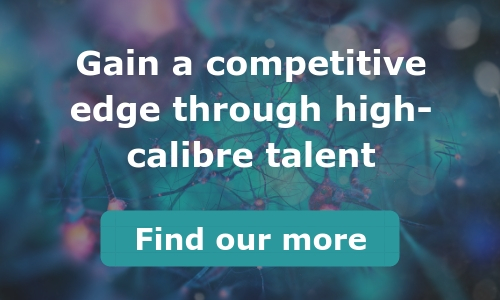An enduring employer brand is essential in the competitive and talent-driven job market that is the life sciences, especially when recruiting for senior management and executive-level roles. Utilising your employer brand to its full potential will help you:
- Attract and engage top talent: Both active candidates seeking new opportunities and passive candidates working for your competitors.
- Retain talent: By continually refining your Employee Value Proposition (EVP), you involve your employees and build a better workplace.
- Impact the bottom line: By reducing employee turnover, attracting more qualified applicants, reducing time-to-hire and paying less on salaries.
For more on employer brand, read our insight: What is Employer Brand and Why is it Important to your Life Science recruitment strategy.
However, while the benefits of a strong employer brand should be apparent, one should not underestimate the resources required to establish and nurture it. In this insight, we will discuss some of the employer brand challenges you will no likely face and how you can overcome them.
Employer brand challenges:
Buy-in
Leadership buy-in is essential. Management has a tendency to mistakenly believe that the corporate brand is strong enough to negate the employer brand. While a strong corporate brand certainly helps, it says nothing about who you are as an employer.
Corporate and employer brand are entwined. By investing in employer brand, you will raise the profile of the corporate brand. After all, customers are less inclined to purchase from a company with poor employee relations, especially if there has been extended media coverage on the subject.
By investing in your employer brand, not only do you reduce the likelihood of such events unfolding, but you will attract top talent, meaning you have the potential to improve your products, service and value proposition, which in turn will enhance your corporate brand. A win-win scenario.
The solution: Create a business case that outlines a strategy for developing and nurturing your employer branding while presenting the benefits it can unlock for your organisation.
Synergy
We’ve already discussed how your corporate brand and employment brand are interconnected, yet they are ‘owned’ and managed by different functions, whose remit could not be more different. Employer brand naturally sits with Human Resources (HR, while marketing owns the corporate brand. If you have a press or comms department, the water’s just got muddier.
However, your employer brand, like your corporate brand, requires a consistent message and visual identify, something that your marketing or comms team will be apt at crafting. You then need a strategy to get your message to the market. Without continual iteration, you risk losing your employer brand’s identity. Once again, your marketing or comms team will be happy to oblige.
See where we are heading? If your marketing or comms team are apt at crafting messaging, visuals and video, and developing and implementing strategy to disseminate them effectively, wouldn’t your employer brand benefit from their expertise? Not just to help design the careers website or assist with production of collateral, but helping you shape and deliver the employer brand strategy.
Yet many teams operate in rigid silos, resulting in duplication of efforts. What’s worse, their efforts could undermine each over, resulting in even greater waste.
The solution: Coordinate employer brand campaigns across your HR, marketing and/or comms team, ensuring both are actively involved in developing and delivering the strategy.
RELATED: Increase quality-of-hire by partnering with a reputable boutique talent consultancy
Message
We’ve briefly touched on the importance of a consistent message and visual identity for your employer brand, but let’s focus on why that is important and how you can ensure harmony.
As eluded to earlier, it’s not enough to have a powerful corporate brand. Candidates want to know what it’s like to work for your organisation and what they’ll get out of it in return.
To achieve this, your employer brand should be in-sync with your corporate brand and convey the same values (albeit for a different purpose). However, the true extent of that alignment will depend on how closely your customer and candidate personas match. If they are markedly different, your EVP should weight your messaging to ensure you attract the right talent.
Likewise, if the candidate experience fails to live up to the hype of your employer brand, you’re in trouble. Disconnect here could cause qualified candidates to drop of out the hiring process, or not apply altogether. They may even see this lack of cohesion as a sign that the business lacks authenticity. You can’t fabricate your employer brand. You (and your employees) must believe in it.
The solution: Ensure a consistent tone-of-voice, not just across your employer brand campaigns, but all your hiring touchpoints, from the job description through to the employee handbook.
Belief
Your employees must believe in your employer brand. If they don’t, you risk your employer brand being out-of-touch with how your employees perceive you as an employer, meaning you’ll be communicating one message and your employees another. Who do you think prospective applicants will trust? Your employer brand campaign or reviews from employees on Glassdoor?
By continually refining your EVP and involving your employees in the process, you are building a better workplace. Employees want to work for companies with a vibrant culture they can be part of. In fact, your company culture should match the type of employee you want to attract! Shaping your EVP to match your employee’s values will result in them becoming brand ambassadors.
The solution: Be sure to focus on your internal audience through communications and experiences which educate and involve your employees in crafting your employer brand.
Resources
Resourcing is vital to building and nurturing your employer brand. Yet HR, the very function expected to take the lead on employer brand in most organisations, is stretched to the limit, HR’s broad remit extends to hiring and onboarding, training and development, engagement and wellbeing, discipline and termination, compliance with employment law and maintaining employer brand. With such big asks, it’s no wonder that employer brand plays second fiddle to operational activities, or worse, is penned onto someone’s job description as an afterthought.
The solution: Develop an employer brand strategy that includes buy-in from all of the relevant stakeholders and departments while providing your staff with the resources they need to action it.
As you set forth on your employer brand journey, you will likely encounter many, if not all, of the hurdles above. But preserve. Armed with this insight, you will be able to navigate these employer brand challenges and not lose momentum. Above all, a business case is absolutely vital to ensuring that you get leadership buy-in and help you define a strategy to shape your employer brand.
For more hiring advice tailored to hiring managers in the life science industry…
- Read What Is Employer Brand And Why Is It Important To Your Life Science Recruitment Strategy?.
- View our talent solutions to see how we can help you gain a competitive edge through talent.
* Fraser Dove International is a talent consultancy operating exclusively across the life sciences industry. While our roots lie in executive search, we provide more than the traditional recruitment services. Uniquely placed within the market, we have been providing cutting-edge talent solutions and insight to organisations at all stages of their journey – from start-up to established leaders – since 2013.

 Estimated read time: 5 mins
Estimated read time: 5 mins Date posted:16/08/2019
Date posted:16/08/2019





